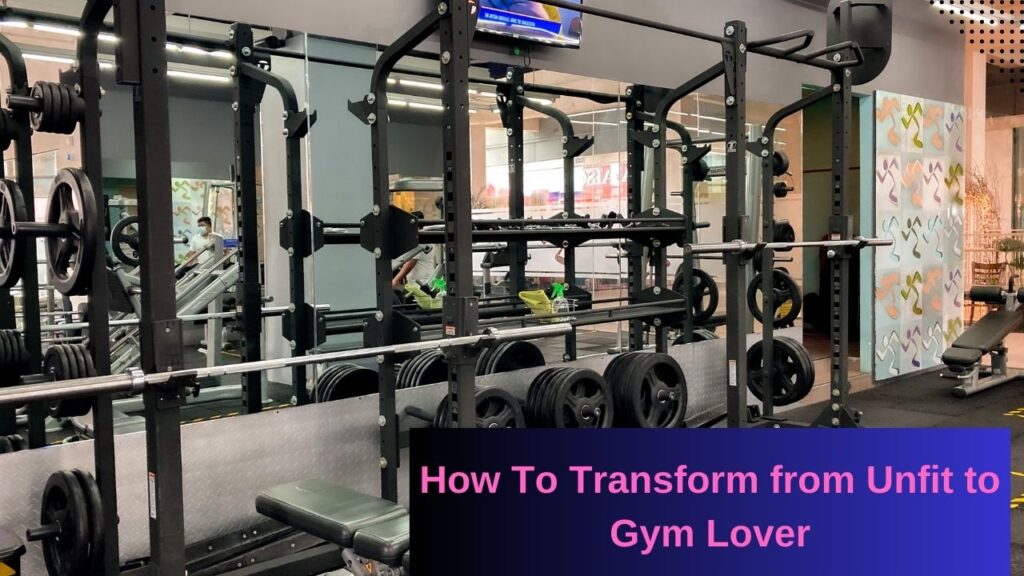How To Transform from Unfit to Gym Lover
Embarking on a fitness journey can be intimidating, especially if you consider yourself unfit or have limited experience with exercise. However, with the right mindset, approach, and consistency, you can transform from being unfit to becoming a gym lover. In this article, we will explore effective strategies to help you make this transformation and develop a lifelong love for fitness.

Start with Realistic Expectations:
Starting with realistic expectations is an important aspect of embarking on a fitness journey. Here’s an explanation of why it’s crucial and how to approach it:
- Avoid Overwhelming Yourself: Setting unrealistic expectations can lead to feelings of overwhelm and frustration. If you expect immediate and dramatic results, you may become discouraged when progress doesn’t happen as quickly as anticipated. By starting with realistic expectations, you give yourself a more balanced perspective and set yourself up for long-term success.
- Gradual Progression: Fitness is a journey that takes time and consistent effort. It’s important to understand that significant changes to your fitness level or physique don’t happen overnight. Realistic expectations allow you to appreciate the incremental progress you make along the way. Celebrating small victories and acknowledging steady improvements can help maintain motivation and dedication.
- Individual Differences: Each person’s fitness journey is unique, and progress can vary based on factors such as genetics, starting fitness level, lifestyle, and commitment. Comparing yourself to others or expecting to achieve the same results as someone else can be counterproductive. Instead, focus on your own progress and embrace the improvements you see in yourself, regardless of how they compare to others.
- Sustainable Habits: Realistic expectations promote the development of sustainable habits. Engaging in extreme or unsustainable practices to achieve quick results often leads to burnout or injury. By adopting a realistic approach, you can create a fitness routine that is enjoyable, manageable, and sustainable in the long run. This allows you to build a solid foundation for ongoing progress and continued motivation.
- Mental and Emotional Well-being: Unrealistic expectations can negatively impact your mental and emotional well-being. Constantly striving for unattainable goals can lead to feelings of inadequacy or self-doubt. On the other hand, setting realistic expectations promotes a positive mindset, self-acceptance, and a healthier relationship with exercise. It allows you to appreciate your efforts, be proud of your achievements, and enjoy the journey.
Define Your Why:
Identify your personal motivations for wanting to become fit and develop a love for the gym. Whether it’s improving your health, increasing energy levels, boosting confidence, or achieving specific fitness goals, having a clear and meaningful why will provide the necessary drive and commitment.
Find Activities You Enjoy:
Discover physical activities that you genuinely enjoy. Experiment with different types of exercises, classes, or sports to find what resonates with you. It could be weightlifting, cardio exercises, yoga, dance, swimming, or team sports. When you engage in activities you enjoy, you’re more likely to look forward to your workouts and develop a passion for fitness.
Set Small, Achievable Goals:
Start with small, achievable goals to build momentum and create a sense of accomplishment. Break down your fitness journey into smaller milestones that are challenging yet realistic. Celebrate each achievement along the way, as it will help you stay motivated and committed to your fitness routine.
Seek Professional Guidance:
Consider seeking guidance from a qualified personal trainer or fitness professional, especially if you’re new to exercise or unsure about proper techniques. A trainer can create a tailored workout plan, teach you correct form, and provide motivation and support. Their expertise can help you progress safely and efficiently, increasing your confidence and enjoyment in the gym.
Create a Consistent Routine:
Establish a consistent workout routine that fits your schedule and lifestyle. Consistency is key to developing a love for the gym and seeing progress. Aim for a balance between challenging workouts and giving your body adequate time to rest and recover. Start with a manageable frequency, such as three to four days per week, and gradually increase as your fitness improves.
Embrace Variety:
Avoid monotony by incorporating variety into your workouts. Mix up your exercises, try different equipment, and explore various workout formats or classes. Variety keeps things interesting, prevents boredom, and challenges your body in different ways. It also helps target different muscle groups and keeps you engaged and motivated.
Track Your Progress:
Document your progress to stay motivated and track your achievements. Keep a workout journal or use fitness apps to record your workouts, sets, reps, and weights. Tracking your progress allows you to see how far you’ve come, provides a sense of accomplishment, and helps you identify areas for improvement.
Find a Supportive Community:
Join a gym or fitness community where you feel welcomed and supported. Surrounding yourself with like-minded individuals can boost your motivation, provide accountability, and offer a sense of camaraderie. Engage in group classes or connect with fellow gym-goers to share experiences, tips, and encouragement.
Celebrate Non-Physical Benefits:
Recognize and celebrate the non-physical benefits of your fitness journey. Notice improvements in energy levels, mood, mental clarity, stress reduction, and overall well-being. Embrace the positive changes that extend beyond the physical transformations, as they reinforce the joy and love for fitness.
Conclusion:
Transforming from being unfit to becoming a gym lover is an empowering and rewarding journey. By setting realistic expectations, defining your why, finding enjoyable activities, setting achievable goals, seeking professional guidance, establishing a consistent routine, embracing variety, tracking progress, finding a supportive community, and celebrating non-physical benefits, you can develop a lifelong love for fitness. Remember that every step forward, no matter how small, brings you closer to a healthier, fitter, and happier version of yourself.
